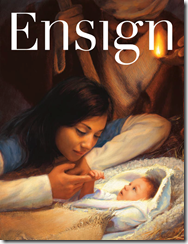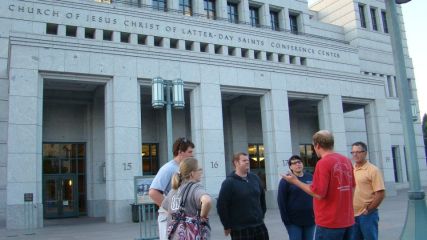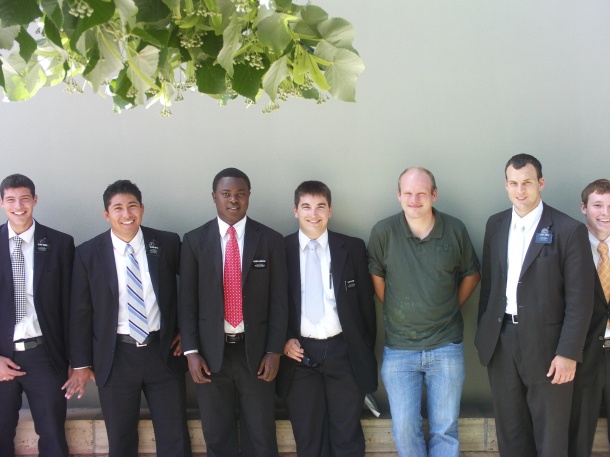The mists of time lend one a certain romance, Alan Bennett
Its that time of year again. Folk are getting excited about the season, buying and wrapping gifts, some have already got a carol service or two under their belt, along with some mince pies perhaps, and there is a general sense of good will in the air. Mormons are no different in this respect. The December Ensign touches on the great themes of Christmas, the birth of a son, the story of shepherds and angels, the visit of kings. Mormons like to think of themselves as just like everyone else at this festive season.
At the same time, the traditional message of Mormonism is one of distinctions, things that set Mormons apart. Think of the founding claims of Mormonism; other churches are corrupt and wrong, Mormonism is “the only true church,” Mormons have the only true gospel, restored to earth after 1900 years of darkness and apostasy.
How do Mormons hold these conflicting ideas at the same time? How can they be like other Christians and yet so distinct as to be “the only true church?” When we read the items in the Ensign the discerning among us will easily identify the distinguishing marks of Mormonism.
Happiness a Spiritual Fruit?
The Bible message is of God come to dwell among men to serve and, ultimately, to die for men’s sins, then rise again, breaking the bonds of death and inviting all who would to come to God by grace, through faith in Christ (Romans 10:9-13; Hebrews 4:14-16)
The Mormon message is of the Son of God come to dwell among men, to inform and educate people in the “great plan of happiness” God the Father has devised for us. Mormon “salvation” is no more than resurrection, while what Christians understand to be salvation, eternal life in the kingdom of God, Mormons call exaltation and it is earned.
 Henry B Eyring states, “You have felt happiness as you have kept the commandments of God. That is the promised fruit of living the gospel (see Mosiah 2:41)” The first presidency message (p4) mentions happiness no fewer than 13 times in an article just 656 words long. Happiness is the great theme of Mormonism, the gift Mormons bring their neighbours, but where does the Bible say Christ died to educate us in the art of happiness?
Henry B Eyring states, “You have felt happiness as you have kept the commandments of God. That is the promised fruit of living the gospel (see Mosiah 2:41)” The first presidency message (p4) mentions happiness no fewer than 13 times in an article just 656 words long. Happiness is the great theme of Mormonism, the gift Mormons bring their neighbours, but where does the Bible say Christ died to educate us in the art of happiness?
The Bible clearly teaches that “the fruit of the Spirit is love, joy, peace, patience, kindness, faithfulness, gentleness, self-control…” (Galatians 5:22-23) Something as trite and temporary as happiness is not found here. Note also that those things that Mormons would regard as the root of their happiness, those acts of obedience demonstrated in kindness, faithfulness etc. are not roots at all but they are fruit of an abiding in Christ, as explained in Jesus’ description of the vine and the branches in John 15.
God and Son
But isn’t Jesus “the Son of God” as Mormons say? Another distinction is discovered in the visiting teaching message p7, The Divine Mission of Jesus Christ: The Only Begotten Son. Here we learn that the only thing that distinguishes Jesus from the rest of mankind is not his position as the second member of the Christian godhead but because he was born of God the Father and a human mother.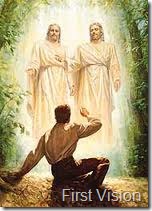
In Mormonism all mankind is literally born of God in a premortal existence and God is as much our Father as he is Jesus’ Father, Jesus himself being our elder brother by premortal birth. In this familiar picture of Joseph Smith’s “First Vision” you are effectively seeing a father and two sons. That being so, Mary was also a daughter of God in that premortal existence, which means that for Jesus to be born on earth of a Divine Father and mortal mother the Mormon God would have to have had an incestuous relationship with Mary. Mormon leaders have asserted as much:
“The Only begotten of the Father (Moses 5:9) ‘These name titles all signify that our Lord is the Only Son of the Father in the flesh. Each of the words is to be understood literally. Only mean only; Begotten means begotten; and Son means son. Christ was begotten by an Immortal Father in the same way that mortal men are begotten by mortal fathers” (Bruce R McConkie, Mormon Doctrine)
“The Saviour was begotten by the Father and his Spirit, by the same Being who is the Father of our spirits, and that is al the organic difference between Jesus and you and me.” (Brigham Young, JOD 4, 218)
Joining the Parade
Then there is an article on becoming Better Saints Through Interfaith Involvement (p28) There are two important points I want to raise here. Mormonism is founded on the claim that all churches are wrong and all those who profess the Christian message of the past two thousand years are corrupt (JSH 1:19) That message is being taken to your neighbours as you read this, make no mistake. John Taylor, third Mormon president said of such initiatives:
“We talk about Christianity, but it is a perfect pack of nonsense…Myself and hundreds of the Elders around me have seen its pomp, parade, and glory; and what is it? It is a sounding brass and a tinkling symbol (sic); it is as corrupt as hell; and the Devil could not invent a better engine to spread his work than the Christianity of the nineteenth century.” (JOD 6, 167)
This statement was made in 1893. Exactly 220 years later Mormons find themselves encouraged to join this same parade of pomp and glory.
My second point regards the claim Mormons make that Evangelical Christians “don’t believe in good works.” It is a common enough statement to those who take the trouble to engage with Mormons but it is patently not true. Mormons should know this since it is they who “do good works” alongside other churches that teach a gospel of grace.
They waste no time telling the world how engaged they are with their neighbours of “other faiths,” as they like to call us, and yet they insist we don’t believe in good works. They expect to find us idle even as we work alongside them for the good of the wider community
How do Mormons deal with such cognitive dissonance? To be so conflicted must come at some great cost. They boast they are different yet insist they are like us. They despise our parade and yet they want to join in, bang their drum, and mingle with the crowd. They accuse us of having a cheap grace yet happily work alongside us as we sacrifice ourselves in service to others, all the time boasting of their own works yet failing to recognise ours.
Generations
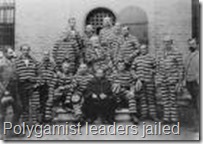 The first thing to realise is that different generations join a different Mormon Church. The Mormons of the 19th century were prepared to go to prison, even to die rather than relinquish their practice of polygamy. Even into the early 20th century Mormon leaders died on the run from the law. A whole package of doctrine supported this faith that polygamy was the order of heaven and no earthly power was going to stop it.
The first thing to realise is that different generations join a different Mormon Church. The Mormons of the 19th century were prepared to go to prison, even to die rather than relinquish their practice of polygamy. Even into the early 20th century Mormon leaders died on the run from the law. A whole package of doctrine supported this faith that polygamy was the order of heaven and no earthly power was going to stop it.
In much of the 20th century, while Mormons no longer practiced polygamy outside their temples, that package of doctrine was till taught and clearly understood by Mormons who looked to a future time when it would be restored, perhaps in the millennium. I remember well and taught enthusiastically all that Mormonism had taught about this “celestial doctrine.”
In the last days of the 20th century and into this 21st century Mormons regard polygamy as an historical curiosity, something of its time but certainly of no great doctrinal significance for them. You will hear Mormons dismiss it and say they don’t even fully understand the whole business other than as something that happened a long time ago. The same might be said, need I remind you, of the Mormon doctrine of denying Black people the priesthood until July 1978.
The second point is demonstrated by another article on page 54, a report about sermons from early church leaders recovered because transcribed from the shorthand in which they were originally recorded. You might expect the Mormon Church to shy away from publishing such potentially incriminating material since the Mormonism of those far distant days is very different from the Mormonism of 2013/14.
But there is something about the passing of time that lends a certain romance to the good bits of history and something of irrelevance to the bad. The Mormon Church plays on this helpful illusion that time lends to just about anyone’s story.
The mists of time allow them to say they don’t really know what was meant so long ago and in such circumstances. Scott Gordon said something like this, as reported in Bobby’s blog post last week. In such ways the different generations of Mormonism are built up, given a new, contextual meaning where once their meaning was timeless.
Where we see Mormons conflicted Mormons refuse to see such conflict. The Mormon Church helps by continually rewriting their history and urging Mormons to think only of what is in front of them, their generation’s story. It depends on where in this web of lies you are but each generation has found comfort in its own untruths. I was thinking of the words of the song Windmills of Your Mind –
Like a tunnel that you follow
To a tunnel of its own
Down a hollow to a cavern
Where the sun has never shone
We can’t assume the Mormon standing in front of us has traversed any particular tunnel or is familiar with the particular dark cavern we first encountered Mormonism. Each will have their own set of ideas, their own understanding to reassure them and it is these, as much as anything, we must first deal with.
What is certain is that the Son has not shone in their lives and it is the message of grace, of the cross that is always our destination as we witness; that never changes. This Christmas lets remember the child in a manger born to die on a cruel cross for the sins of the world, including Mormons who, despite their protestations to the contrary, have yet to know him.
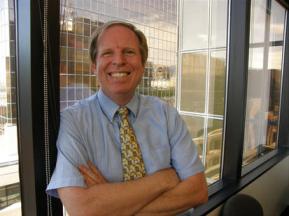
Recently Scott Gordon who is the President of FairMormon, one of the main Mormon Apologetics organizations was interviewed on a Christian Podcast called Issues Etc. You can find that particular episode here.
I am doing this post to invite Mormons who read this article to give that episode a listen, and let me know what you think. Gordon is asked a number of questions on the beliefs of Mormons, and many things he said particularly with regards to the LDS view on the nature and origin of God really surprised me. I will say from the start that I appreciate that Gordon does not speak officially for the LDS church so he is welcome to have his own view on these issues, however he does preside over what is probably the most well established and well known institution seeking to defend the truthfulness of the LDS Church, so you you would expect him to give some honest good answers, I feel that this is far from the case.
At around 21:00 Gordon says that he really does not know that the LDS Church teaches that God was once a man, the interviewer quotes this Joseph Smith in his King Follet sermon where he says this:
We have imagined and supposed that God was God from all eternity. I will refute that idea, and take away the veil, ……
The interviewer asks what does Joseph Smith mean if not, God was once a man? Gordon says this:
“The answer is, we dont know, the reason we dont know is because he was killed shortly after that, since then much speculation has jumped up about that, you will get quotes from people that talk about similar kind of things.”…….”That gets into speculative theology because we really dont know.”
This is amazing to me, its almost history repeating itself if you remember a certain interview of past Mormon Prophet Gordon B Hinckley. Where in time magazine when asked about this same thing he said:
‘I don’t know that we teach it. I don’t know that we emphasize it … I understand the philosophical background behind it, but I don’t know a lot about it, and I don’t think others know a lot about it,’”
It seems that to the outside world Mormons just back away from this, yet lets see what one of their own Official Church manuals: ‘Achieving a celestial marriage’ 1992, which I own a copy of says this at the top of page 4.
God was once a man who, by obedience, advanced to his present state of perfection; through obedience and celestial marriage we may progress to the point where we become like God.
2nd Mormon Prophet Brigham Young said:
“The doctrine that God was once a man and has progressed to become a God is unique to this Church. How do you feel, knowing that God, through His own experience, ‘knows all that we know regarding the toils [and] sufferings’ of mortality?” (Teachings of Presidents of the Church: Brigham Young, p. 34. Brackets in original).
And of course 5th Mormon Prophet Lorenzo Snow Said:
“As man is now, God once was; as God is now, man may be” (The Teach- ings of Lorenzo Snow, p. 2. Italics in original. See also The Life and Teachings of Jesus and His Apostles manual, 1979, p. 59)
This has been reinforced in this years LDS Teaching manual which this blog has been going through as well.
Feeling that he had received “a sacred communication” that he should guard carefully, Lorenzo Snow did not teach the doctrine publicly until he knew that the Prophet Joseph Smith had taught it.2 Once he knew the doctrine was public knowledge, he testified of it frequently.
In addition to making this truth a theme for many of his sermons, he adopted it as the theme for his life. His son LeRoi said, “This revealed truth impressed Lorenzo Snow more than perhaps all else; it sank so deeply into his soul that it became the inspiration of his life and gave him his broad vision of his own great future and the mighty mission and work of the Church.”3 It was his “constant light and guide” and “a bright, illuminating star before him all the time—in his heart, in his soul, and all through him.”4
So it is simply amazing to me that Gordon backtracks from this so much, it seems that sometimes what is said in house is very different to what some Mormons want to tell the outside world. These are not abstract comments from nobodies in the LDS Church that I have quoted. Rather they are held as “Prophets” who the LDS Church teaches are those that speak for God today. Please give the interview a listen for yourself.
Also Bill Mckeever of Mormonism Research Ministry has been on this podcast since sharing his thoughts on Gordons comments, you can find that here.
James White of Alpha and Omega Ministries has also spent two episodes of his podcast on this, please check those out below, they go into a lot more depth than I have here and are really worth the time.
I just cannot understand how someone in the position Scott Gordon is in can simply say “I dont know” in light of the absolute wealth of information from the LDS Church on this issue. Many of the answers he gives in this interview are very light and do not seem to reflect what Mormon Authorities have said. I appreciate there will be many LDS people who will very much disagree with what Scott Gordon said on this interview and some will agree, which one are you?
![]() ]]>
]]>
![]() ]]>
]]>
Some of you may remember a while ago we had Ned Scharisbrick from the FairMormon Podcast do an episode responding to some articles on this blog. This was a great chance to have some online communication with Ned. In the process of this he very kindly offered to have me go on his podcast and have some dialogue with him. Ned runs an episode called the 4th watch, looking out for challenges and criticisms of the Mormon faith.
For those who dont know Fair is the Foundation for Apologetics information and Research and is one of the main organizations defending Mormonism from a faithful LDS perspective.
Well this week that episode went online on the Fairblog Podcast. You can find the episode here, or listen on the audio file below.
Bobby on the Fairblog podcast.
I very much appreciated Ned having me on, and I think this was a good example of respectful dialogue. I will let the episode speak for itself rather than offering some commentary on it myself, but we discussed the issue of what does it mean to be saved.
One thing I would say is in the introduction to the episode text it says this:
Mr. Gilpen comes from the evangelical Calvinist tradition of Christianity and the term ‘anti’ may come across as disrespectful to those who are actually kind to members of the LDS Church. The term anti in this discussion is used to represent those who are against or openly opposed to the teachings of the Church of Jesus Christ of Latter-day Saints, much as the term “pro” could be used for those who agree with or openly promote the teachings of the LDS Church.
I appreciate the explanation of what Anti-Mormon means here but I am still sad to see this used, I think it would be much more helpful if those engaged in LDS Apologetics start to publically state the difference between those that are LDS Critics and Anti-Mormons. As many Mormons maybe even to this episode will switch off when they see this term. Anti-Mormons in the mind of many Mormons refers to people who are opposed to them as people and are to be avoided, this is by no means what I am, and I think Ned does appreciate this.
However again all of that said I very much appreciate Ned having me on and I look forward to any comments that may come.
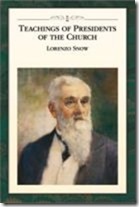
“Cultivate a spirit of charity; be ready to do for others more than you would expect from them if circumstances were reversed.”
Obviously doing good to others is a good and Godly principle. LDS, like main stream Christians seek to follow this biblical principle of Charity and service, loving your neighbour, treating others as you would expect to be treated yourselves. This chapter begins with a story of Lorenzo and his family’s exodus from Norvoo, they helped a man who needed a ride on their wagon and in turn the man (who happened to work in repairing wagons,) repaired the wagon for the family when they were in desperate need. Lorenzo commented that this situation reinforced in him the principle that one favour often leads to another.
the next heading states…
“We are Children of the same Heavenly Father, and we have been sent into the world to do Good.”
Lorenzo speaks here of the LDS belief that everyone on earth is literally brothers and sisters as they were conceived and born in heaven as spirit children of God the Father and his wife. Therefore with this in mind he advocates LDS to treat their kin well, treating them as they would a brother or a sister.
As part of this doing good to others, Lorenzo also calls LDS to share their learning, saying that by “communicating his information while engaging in learning it,” a person can learn all the more. Pursuing education is strongly encouraged within the LDS church.
Seek ye out of the best books words of wisdom, seek learning even by study and also by faith.” -Doctrine and Covenants 109:7
Lorenzo goes on to discuss how we should seek the good of our friends, and sacrificing for the sake of others.
“We see this in the Savior, and in brother Joseph, and we see it in our President ( Brigham Young ). Jesus, brother Joseph and brother Brigham have always been willing to sacrifice all they possess for the good of the people.”
I have to say that I am offended here on behalf of our Savior that Lorenzo would even think to compare anyone to Him. By all means advocate living a sacrificial life, and yes perhaps Joseph Smith and Brigham Young did this to some extent, but I think Jesus is in a league of His own.
I think to some extent Lorenzo puts across the idea that, one favour leads to another in return, to help others does you good, in teaching others you will learn more, by sharing knowledge your, “mind will expand, and that light and knowledge which he (you) had gained would increase and multiply” Sure I agree that their are “treasures in heaven,” like in the story of the servants who are given talents to use wisely, (Matthew 25:14-30), those who do use them wisely will receive a reward. But then we also have the story of the good Samaritan, what was his reward?
To know he had done the will of the Father, and perhaps more in the next life. Did he receive a reward in this life we’ll never know, but I believe he did this good service to his fellow man purely out of a love for and obedience to God.
Quite a short post for me, I think we’re largely in agreement that we should do good to others, as the Bible instructs.
As always I’m happy to receive your feedback

Hey there all. As many who have been reading this blog for a while will know, I have been to Utah on mission trips for 3 years running between 2010 and 2012. These have been seriously some of the best times of my life. I have been on a daily basis actively involved in reaching out to LDS people as well as meeting, training and connecting with various Christians from Utah and other parts of the USA. My main contact is Russ East from Utah Partnerships for Christ.
Russ runs a ministry hosting mission trips from all over America and the world seeking to reach out to the residents of Utah. On every visit I have stayed and worked with Russ, being involved with outreach at Temple Square in Salt Lake City and also the Manti Miracle Pageant, where each night 14,000 Mormons come and watch a re-enactment of their theology and believed history, here is a discussion I had there.
As well as reaching out to Mormons on my last trip I was also involved with training and equipping Christians. Here I am giving some guys a tour of temple square.
During these visits I have also been on Heart of the Matter with Shawn Mccraney twice, here is one of my appearances at the end of this video.
So what is my point in all this? Well I want to go back to Utah, every year from 2014 onwards. In fact my wife Vicky and I are in genuine hope and prayer that one day in the next 5 years or so we want to move to and live in Utah. However these trips are expensive and so this post is an unashamed request, that you would consider supporting me to go to Utah on a mission trip in 2014.
For this trip I plan to:
- Be very active in outreach to LDS people in Utah, particularly at the Manti Miracle Pageant.
- Make contact with local Christian Churches in Utah, seeking to build relationships and raise support for a permanent Utah move.
- Build relationships with Key Christians in Utah already active in evangelism to LDS people.
- Report back to you on what is going on and keeping you up to date in all that you are supporting me to do over there.
This is your chance to have an active impact on LDS people not only in the UK but around the world. Please prayerfully consider supporting me for this trip. Anything you contribute however big or small with be massively significant in helping me to make this trip. I estimate I need to raise around £1000 to go for around two weeks. You can contribute by emailing me on bobbygilpin@gmail.com for info, You can also give via paypal by clicking here. Or by clicking the paypal button below.
Thank you for reading, more updates on this to follow.

Hi there all as some of you know I recently had a great time having Russ East over from Utah Partnerships for Christ staying in the UK for a few days. While he was here he went on the Radio show Unbelievable? On premier Christian Radio with Justin Brierly.
Recently Hans Mattsson who was in the Europe area presidency for the LDS Church had a crisis of faith, this was so significant it made the New York Times, you can see the article here.
Russ has dialogue on this show with Brian Hales, an LDS scholar who has recently wrote a number of books from a faithful Pro LDS perspective about Joseph Smiths Polygamy. Russ and Brian have dialogue on this show about whether Mattsson’s crisis of faith was a natural response to the information he learned about Joseph Smith, this is really worth a listen.
You can listen from the Unbelievable site here or directly on our page below.
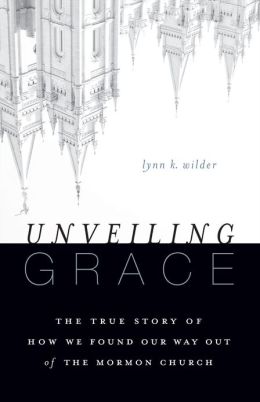
Recently there has been a really excellent book release called Unveiling Grace by Lynn Wilder. Lynn was an LDS member and during some of that time a BYU professor. In many years of reading many books of this kind this is easily one of the best. There is an excellent insight into Utah Mormon life, and the transition and struggles that many go through in leaving Mormonism and coming to Christ. This book is really worth a read. Also below is Lynn and her husband Michael sharing their story.
The book can be bought at Amazon UK and Amazon US as well as in many other bookstores.
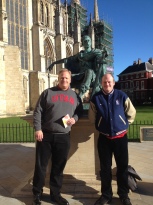
We had a great time last night teaching on Mormonism from a Christian perspective and having Russ East here in Middlesbrough, UK from Utah sharing his story. Thanks to all that came and for those that did not, please check out the podcast here. Or the recording below.

Hi there all this is just a quick update to let you know that we have Russ East currently staying in the UK for a few days. Russ runs our parent ministry Utah Partnerships for Christ. Today I recorded an interview with Russ that has gone onto our ministry podcast talking about what he does in Utah and why, you can find that here. Or just listen to it on this page below.
Also if you are in the Middlesbrough area tomorrow night on the 4th November. We are having an event at Melbourne House on Newport Road at 7:30pm where Russ will be sharing his story of leaving Mormonism and coming to Christ. If you would like more information please contact me, my details are on the left of this article. There is also a facebook event for this here.
thanks a lot
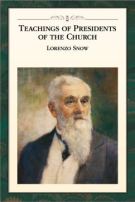
For this review I am going to focus on the part of the chapter entitled Teachings of Lorenzo Snow and not look at the beginning of the chapter entitled From the Life of Lorenzo Snow. I have chosen to do this for two reasons: firstly, I feel that my role in writing this post is to address the differences between LDS teaching, belief and doctrine and Biblically-based Christian teaching, and secondly, I found that I had so much I wanted to deal with in the ‘teachings’ section that it seemed unnecessary to dwell on the other areas.
I would first like to look at this bold claim: “That Adam, Enoch, Noah, Abraham, Moses, and other ancient worthies had this religion successively, in a series of dispensations, we, as a people, verily believe. … Mormonism, in short, is the primitive Christian faith restored, the ancient Gospel brought back again.” I would like to know what evidence the LDS church has to substantiate such a claim. Their religion is based heavily on the idea of eternal families being sealed together in exclusive temple ceremonies. Through these ceremonies, people can progress along a path that can ultimately lead to godhood. These principles are not found in the accounts we have of Adam, Enoch, Noah, Abraham and Moses and they certainly do not resonate with the teachings, actions, life, death and resurrection of Jesus as contained in the New Testament. Neither do the epistles addressed to the early churches contain anything that can be described as Mormonism. No path to godhood, no salvation by “grace after all we can do”, no belief in one Prophet, seer and revelator overseeing and running one all-encompassing organisation, no Aaronic and Melchizedek Priesthoods, no exclusive temple ceremonies, no obligation to pay ten per cent of all income to the prophet’s organisation. A claim such as the one above really ought to be backed up with evidence to support it.
In the paragraph following the one quoted above, we read of a kingdom being established where “light and intelligence shall be so generally diffused that it shall no longer be necessary for any man to say to his fellows, “Know ye the Lord, but all shall know him, from the least unto the greatest;” [see Jeremiah 31:34]”. Yet the Lord of this Kingdom, who should be so easy to identify, is in fact rather difficult to get a grasp of when we actually look in detail at LDS sources:
“Jesus, our elder brother, was begotten in the flesh by the same character that was in the garden of Eden, and who is our Father in Heaven” (Brigham Young in ‘Journal of Discourses’, 1:50-51)
“And behold, he shall be born of Mary, at Jerusalem which is the land of our forefathers, she being a virgin, a precious and chosen vessel, who shall be overshadowed and conceive by the power of the Holy Ghost, and bring forth a son, yea, even the Son of God.” (Alma 7:10) Please note that this verse not only incorrectly states the birthplace of Jesus, but also contradicts the previous quote.
Therefore, it does not appear clear that the teaching of ‘the Kingdom’ in relation to ‘the Lord’ is clear or consistent even with itself or with the Bible. So it would seem that the ‘light and intelligence’ brought about by the LDS church has not been helpful in aiding people to ‘know the Lord’.
This section of the chapter also refers to the prophecy made in Joel which states that “your sons and your daughters shall prophesy”. This is included to build a picture of what the ‘Kingdom’ that the LDS church is establishing is like. Old Testament scripture is being used here to try and legitimise LDS claims, yet to say that women in the LDS version of God’s kingdom can authoritatively ‘prophesy’ is ridiculous. That is the domain of a select few. That select few certainly contains no women!
Continuing the description of this kingdom, we read that “God has set up His Church and Kingdom on the earth for the benefit and blessing of the human family”. Yet, if that is the case, one has to wonder why God would let this kingdom fail so badly in Mormon eyes from the end of the era of the first apostles to Joseph Smith’s ‘first vision’ (a period of around 1700 years) if it were his intention to benefit and bless the human family. The words of Jesus in Matthew 16:18 (I will build my church; and the gates of hell shall not prevail against it) and 24:35 (Heaven and earth shall pass away, but my words shall not pass away) should be enough to make it clear that God’s intentions were that his truth and church would not fall away or be removed from the earth and therefore the notion of a restoration is not something that God would ever have deemed necessary. The chapter goes on to say: “Now talk about this kingdom being destroyed! … Why, you might as well try to pluck the stars from the firmament or the moon or the sun from its orbit! It never can be accomplished, for it is the work of the Almighty.” Mormon teaching would suggest that the church established by Jesus did not even last as long as the LDS church has currently lasted, so how could any Mormon have confidence in the durability of their own organisation when it makes such a claim about the New Testament church established by Jesus himself? The Kingdom of God seems to be a pretty flimsy concept in the LDS understanding.
A little further on is a statement that clears up any doubts about what the LDS church teaches about the Bible: “This Church will stand, because it is upon a firm basis. It is not from man; it is not from the study of the New Testament or the Old Testament”. It would appear that for Mormons there is nothing secure about God’s revealing of his nature, identity and personality in either the Old or New Testament. For an organisation that claims to be Christian, and the only 100% authentic version of Christianity at that, this is quite a bold claim regarding the importance of using the New Testament to understand and come to know the person of Jesus! The chapter continues to explain that the LDS church has, “come directly from the Lord. The Lord has shown it to us by the revealing principle of the Holy Spirit of light”. Really? So you can ignore anything the New Testament has to say about Jesus and instead trust in a religion:
based upon a book written by a man using a rock in a hat to tell him what words should be written,
which contains a book that is built upon a provable lie (the claim that the papyrus used for the translation of the Book of Abraham had writings on it which were written by Abraham himself),
which has contradictory teachings on the nature of God: “How much unbelief exists in the minds of the Latter-day Saints in regard to one particular doctrine which is revealed to them, and which God revealed to me — namely that Adam is our father and God” – Brigham Young, and then: “We warn you against the dissemination of doctrines which are not according to the scriptures and which are alleged to have been taught by some General Authorities of past generations, such, for instance is the Adam-God theory. We denounce that theory and hope that everyone will be cautioned against this and other kinds of false doctrine” – Spencer Kimball. Contradictory positions could also be provided here for the LDS position of polygamy and the rights of black people to hold ‘the priesthood’.
We then read that the Lord “opens to us the secrets of the celestial kingdom” yet neither Jesus nor the early church leaders teach anything about the celestial kingdom or mention anything that would even support the notion of meriting the right to live with God in heaven after we die on the basis of our own actions. In fact the exclusivity of access to the celestial kingdom being through temple attendance, participation and worthiness is in direct contradiction with the Bible. Consider these verses:
“Jesus, when he had cried again with a loud voice, yielded up the ghost. And, behold, the veil of the temple was rent in twain from the top to the bottom” Matthew 27:50-51
“For this is good and acceptable in the sight of God our Saviour; Who will have all men to be saved, and to come unto the knowledge of the truth. For there is one God, and one mediator between God and men, the man Christ Jesus; Who gave himself a ransom for all, to be testified in due time” 1 Timothy 2:3-6
“For he is our peace, who hath made both one, and hath broken down the middle wall of partition between us; Having abolished in his flesh the enmity, even the law of commandments contained in ordinances; for to make in himself of twain one new man, so making peace; And that he might reconcile both unto God in one body by the cross, having slain the enmity thereby: And came and preached peace to you which were afar off, and to them that were nigh. For through him we both have access by one Spirit unto the Father. Now therefore ye are no more strangers and foreigners, but fellow citizens with the saints, and of the household of God; And are built upon the foundation of the apostles and prophets, Jesus Christ himself being the chief corner stone; In whom all the building fitly framed together groweth unto an holy temple in the Lord: In whom ye also are builded together for an habitation of God through the Spirit.” Ephesians 2:14-22
These verses demonstrate clearly that the notion of ‘secrets of the celestial kingdom’ flies directly in the face of the New Testament understanding, and therefore original Christianity’s understanding, of what the teachings, suffering, life, death and resurrection of Jesus mean for us.
The chapter continues: “Our work is … to become more and more perfect as we advance in years”. This is a nonsense. One cannot become ‘more perfect’. Perfection ultimately means a state that can not be improved upon. So to suggest that people can become more and more perfect is impossible. It is also unbiblical to say that any improvement in our condition is down to ‘our work’. Our work is as “filthy rags” (Isaiah 64:6) and the good work that goes on in the heart of a believer is not attributable to the believer, but rather to God: “he which hath begun a good work in you will perform it until the day of Jesus Christ:” (Philippians 1:6)
A little later on, the chapter discusses the commitment and sacrifices expected of LDS members to the cause of their faith or the building up of their ‘kingdom’. Doctrine and Covenants section 98 is quoted here: “I will prove you in all things, whether you will abide in my covenant, even unto death, that you may be found worthy; for if ye will not abide in my covenant, ye are not worthy of me.” Again, we have here an example of the God of Mormonism telling his people that by sticking to the rules, they will then be worthy of him, and that if they fail to do this, they are not worthy of him. Yet we know from the Bible that none is worthy of God (Romans 3:23) and that one is only ‘made worthy’ or justified by the free gift of grace (Romans 3:24) rather than by trying to earn worthiness.
Continuing on in the chapter, LDS believers are reminded that they “are engaged in the work of God. The prospects before us are glorious” and they are then told that they “may increase in knowledge and power”. I am saddened that these appeals to glory of the self and the acquisition of power for one’s self are being made. Is all the effort that this chapter is asking LDS members to make being done for such purposes? Again I turn to Romans to demonstrate the Bible’s view of whose glory we should be concerned with, “if children, then heirs; heirs of God, and joint-heirs with Christ; if so be that we suffer with him, that we may be also glorified together. For I reckon that the sufferings of this present time are not worthy to be compared with the glory which shall be revealed in us.” (Romans 8:17-18) Therefore, believers inherit God’s righteousness and glory, it is not about a path of progression to our own state of godhood where the power and glory are our own. As that famous prayer makes clear: “thine is the kingdom, and the power, and the glory, for ever”.
The conclusion of the chapter builds on this theme of sacrifice in the cause of the LDS church: “I would not give the ashes of a rye straw for any religion that was not worth living for and that was not worth dying for; and I would not give much for the man that was not willing to sacrifice his all for the sake of his religion.” I find this statement problematic since there are a great many people, from a wide variety of religions, who have suffered and died due to their commitment to a sincerely held faith. Such events reveal the depth of that person’s faith and not the veracity of their religion. The theme of persecution is a recurrent one in LDS teaching materials and most LDS are well versed in the notion of being a ‘peculiar people’ and suffering for standing out in this way. It is certain that the early LDS church members underwent some terrible ordeals at certain times and I would not want to make light of that, however, it is worth pointing out that often the people were suffering for their leaders’ practice of polygamy, or in response to a perception that the communal, close-knit Mormon way of life at that time represented a threat in terms of the LDS potentially being a political bloc, or a closed-off unit of industry, productivity and cultural isolation. Let’s not forget why Joseph Smith was even in Carthage Jail in the first place. Whatever the rights or wrongs of the treatment meted out to the early LDS, I think it would be a misrepresentation to suggest that they were suffering for their faith in Christ. Christians this very day are being persecuted around the world for following Jesus and for refusing to renounce their faith. Their struggles are well-documented here: http://www.releaseinternational.org/ Someone who truly suffered for Christ, and whose book I would recommend as probably the most inspirational thing I have ever read outside of scripture, is Richard Wurmbrand. He was a Christian pastor in Romania during the era of communism. He was imprisoned and horrifically abused for many years but never lost his faith. His actions and life speak of a true devotion to Christ and his actions were imbued with total trust in the loving role of Jesus in his life. To conclude my review I will leave you with his words:
“I have seen Christians in Communist prisons with fifty pounds of chains on their feet, tortured with red-hot iron pokers, in whose throats spoonfuls of salt had been forced, being kept afterward without water, starving, whipped, suffering from cold–and praying with fervor for the Communists. This is humanly inexplicable! It is the love of Christ, which was poured out in our hearts.”
